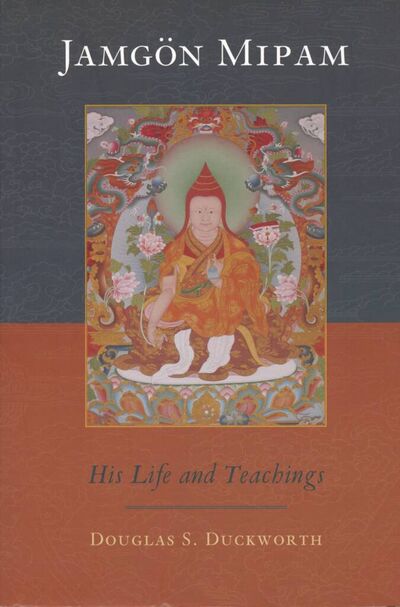No edit summary |
No edit summary |
||
| (3 intermediate revisions by the same user not shown) | |||
| Line 1: | Line 1: | ||
{{Book | {{Book | ||
|BookPerson={{Book-person | |BookPerson={{Book-person | ||
|PersonPage= | |PersonPage=Mi_pham_rgya_mtsho | ||
|PersonName=Jamgön Mipham | |||
}}{{Book-person | |||
|PersonPage=Duckworth,_D. | |||
|PersonName=Douglas Duckworth | |PersonName=Douglas Duckworth | ||
}} | }} | ||
|FullTextRead=No | |FullTextRead=No | ||
|BookToc=* {{i|''Introduction''|vii}} | |||
* {{i|'''Part One: Life and Context'''}} | |||
** {{i|One. Mipam's Life|3}} | |||
** {{i|Two. Background of Buddhism in India|17}} | |||
** {{i|Three. Buddhist Identity in Tibet|39}} | |||
** {{i|Four. Survey of Mipam's Works|55}} | |||
* {{i|'''Part Two: Overview of Mipam's Buddhist Works'''}} | |||
** {{i|Five. Unity|67}} | |||
** {{i|Six. Mind-Only and the Middle Way|81}} | |||
** {{i|Seven. Emptiness and the Nonconceptual|99}} | |||
** {{i|Eight. Immanent Wisdom|119}} | |||
** {{i|Conclusion|135}} | |||
* {{i|'''Part Three: Select Translations'''}} | |||
** {{i|1. Emptiness and Analysis|141}} | |||
** {{i|2. Conceiving the Inconceivable|142}} | |||
** {{i|3. Unity and Buddha-Nature|143}} | |||
** {{i|4. Steps to the Middle Way|145}} | |||
** {{i|5. No-Self|146}} | |||
** {{i|6. Unmistaken Emptiness|147}} | |||
** {{i|7. Meditation on Emptiness|149}} | |||
** {{i|8. Mind- Only and the Middle Way|150}} | |||
** {{i|9. Mind-Only and the Middle Way II|151}} | |||
** {{i|10. Reflexive Awareness|155}} | |||
** {{i|11. Consequence and Autonomy|157}} | |||
** {{i|12. Consequence and Autonomy II|158}} | |||
** {{i|13. Two Truths|160}} | |||
** {{i|14. Unconditioned Buddha-Nature|163}} | |||
** {{i|15. Appearance and Reality|167}} | |||
** {{i|16. From the Two Wheels of Sutra to Tantra|169}} | |||
** {{i|17. EstablishingAppearancesasDivine|170}} | |||
** {{i|18. Fourfold Valid Cognition|173}} | |||
** {{i|19. Practical Advice for Beginners|175}} | |||
** {{i|20. Practical Advice for Monastics|176}} | |||
** {{i|21. Practical Advice on the Path of Illusion|179}} | |||
** {{i|22. Stages to Calm Abiding|182}} | |||
** {{i|23. Stillness, Movement, and Awareness in the Great Seal|187}} | |||
** {{i|24. Method for Sustaining the Nature of Awareness|189}} | |||
** {{i|25. A Quintessential Instruction on the Vital Point in Three Statements|191}} | |||
** {{i|26. Ground, Path, and Fruition of the Great Perfection|192}} | |||
** {{i|27. Bringing Afflictions onto the Path|194}} | |||
** {{i|28. Mind and Wisdom|196}} | |||
** {{i|29. Sutra and Tantra|198}} | |||
** {{i|30. Sword of Intelligence: Method for Meditating on Bodhicitta|201}} | |||
** {{i|31. Lily of Wisdom s Presence|204}} | |||
** {{i|32. Verse of Auspiciousness|208}} | |||
* {{i|''Acknowledgments''|209}} | |||
* {{i|''Notes''|211}} | |||
* {{i|''Glossary''|225}} | |||
* {{i|''Bibliography''|229}} | |||
* {{i|''Index''|239}} | |||
|AddRelatedTab=Yes | |AddRelatedTab=Yes | ||
|QuotesTabContent={{ Blockquote | Since wisdom is unconditioned, it cannot be produced by anything, and for this reason, wisdom must be present from the primordial beginning as the true nature, the buddha-nature, of all sentient beings. | pp. 119-120 }} | |QuotesTabContent={{ Blockquote | Since wisdom is unconditioned, it cannot be produced by anything, and for this reason, wisdom must be present from the primordial beginning as the true nature, the buddha-nature, of all sentient beings. | pp. 119-120 }} | ||
|PostStatus=Needs Copy Editing | |PostStatus=Needs Copy Editing | ||
|BookParentPage=Research/Secondary Sources | |||
}} | }} | ||
Latest revision as of 16:02, 18 June 2020
Jamgön Mipam (1846-1912) is one of the most extraordinary figures in the history of Tibet. Monk, mystic, and brilliant philosopher, he shaped the trajectory of Tibetan Buddhism's Nyingma school. This introduction provides a most concise entrée to this great luminary's life and work. The first section gives a general context for understanding Mipam's life. Part Two gives an overview of Mipam's interpretation of Buddhism, examining his major themes, and devoting particular attention to his articulation of the Buddhist conception of emptiness. Part Three presents a representative sampling of Mipam's writings. (Source: Shambhala Publications)
| Citation | Duckworth, Douglas S. Jamgön Mipham: His Life and Teachings. Boston: Shambhala Publications, 2011. |
|---|---|


